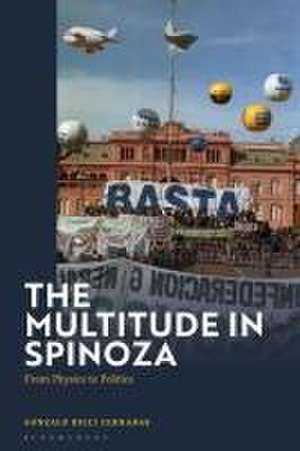The Multitude in Spinoza: From Physics to Politics
Autor Professor Gonzalo Ricci Cernadasen Limba Engleză Hardback – 18 sep 2024
Preț: 509.60 lei
Preț vechi: 730.73 lei
-30% Nou
Puncte Express: 764
Preț estimativ în valută:
97.51€ • 102.07$ • 81.16£
97.51€ • 102.07$ • 81.16£
Carte disponibilă
Livrare economică 10-24 martie
Preluare comenzi: 021 569.72.76
Specificații
ISBN-13: 9781350437692
ISBN-10: 1350437697
Pagini: 208
Dimensiuni: 156 x 234 mm
Greutate: 0.46 kg
Editura: Bloomsbury Publishing
Colecția Bloomsbury Academic
Locul publicării:London, United Kingdom
ISBN-10: 1350437697
Pagini: 208
Dimensiuni: 156 x 234 mm
Greutate: 0.46 kg
Editura: Bloomsbury Publishing
Colecția Bloomsbury Academic
Locul publicării:London, United Kingdom
Caracteristici
Offers a clear introduction to Spinoza's concept of the multitude, guiding the reader through its basis in his philosophy to its relevance and applications in political theory
Notă biografică
Gonzalo Ricci Cernadas is Professor of Philosophy and Modern Political Theory at the Faculty of Social Sciences at the Gino Germani Research Institute, Argentina.
Cuprins
IntroductionPart I: The Body1. Physics in Descartes' "Principles of Philosophy"2. Physics in EthicsPart II: The Multitude3. From Physics to Affects4. The Multitude in the Theological-Political Treatise5. The Multitude in the Political TreatisePart III: Excursus6. The Conceptual Origin of the Multitude 7. The Conceptual Futures of the MultitudePart IV: The State8. Power as potentia and potestas9. The Constitution of Democracy as imperium absolutum10. The Place of InstitutionsConclusion: The Various Faces of the Multitude and the State
